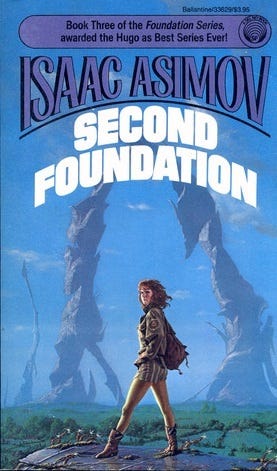Beyond the daily outrage, deep human needs for community, stability, agency, and fairness are driving the political turbulence. The current political "warfare" isn't just a surface-level disagreement over policy points; it's fueled by deeper, often unarticulated, human desires and anxieties.
The future is invented every second. Invent a better one.
— Dr. Hari Seldon
We’re in a crisis phase, as The Fourth Turning describes, where the old order is crumbling, and the future is up for grabs. But to win it, Democrats need to understand what people want - not just what they’re against, but what they’re yearning for. The MAGA movement, for all its flaws, has tapped into something primal: a sense of community, shared purpose, and a clear enemy.
Democrats, too often a coalition of discrete groups - environmentalists, labor, identity advocates - feel fragmented, like a choir singing different songs. Voters crave unity, not a buffet of causes. And critically, voters want to see results.1
Change is another sore spot. It’s coming too fast, and it’s overwhelming. Jobs vanish to automation or outsourcing; cultural shifts, like transgender rights or pronoun debates, spark confusion or backlash; even technology - think A.I. or social media - feels like a runaway train.2 There’s no easy fix; we can’t stop progress. But acknowledging this anxiety, and offering stability where possible, is critical. People aren’t Luddites - they just want a breather.
Worse, many feel they’ve lost agency. The paths to success - college, a steady job, a home - are gone or gated.3 This hits young men hardest, but it’s universal: 63% of Americans, per Pew, believe their lives are shaped by untouchable forces - corporations, government, algorithms. In America, where your job defines your worth, this is soul-crushing.
MAGA promises to “take back control,” but Democrats can do better: expand vocational training, like Germany’s model where 50% of youth enter skilled trades; offer tax breaks to create jobs in struggling regions; and reform accreditation to value skills over degrees. It’s about giving people a stake in their future.
Fairness is another universal cry. People want a shot at a better life, but they feel others - whether immigrants, corporate elites, or “protected” groups - get help while they’re left to sink. A 2024 Gallup poll found 58% of Americans believe government policies favor certain groups over “regular people.” This isn’t just economics; it’s a sense of justice. Democrats must prove we’re for everyone, not just the loudest lobbies.
People do not want to be constantly told they are racist, sexist, homophobic, or otherwise morally deficient. While confronting genuine prejudice is essential, a political discourse that seems to revel in accusation and condemnation alienates far more than it persuades. When every disagreement is framed as a moral failing on the part of those who hold a different view, dialogue becomes impossible, and resentment festers. People want to be understood, not perpetually indicted.
Flowing directly from the above, people intensely dislike what they perceive as "political correctness" run amok. They resent feeling like they have to walk on eggshells, constantly afraid that an innocent remark or an outdated opinion could lead to social ostracism, professional repercussions, or public shaming.
This isn't a desire to be offensive;4 it's a desire for a measure of grace, for the freedom to speak their minds without fear of disproportionate retribution, and a weariness of constantly shifting linguistic and behavioral goalposts.
So, the monumental question arises from all this: how do we, as a nation, achieve a clear, decisive win for a more equitable, prosperous, and unified post-crisis world without descending into further actual warfare, be it a hot civil conflict or escalating global confrontations? The answer lies in crafting a political agenda that directly and honestly addresses these deep-seated wants and anxieties.
This requires a playbook that offers not just policies, but a pathway back to security, agency, and a believable vision of a shared American future.
«previous Part 4 of 6 next»
A 2025 Pew survey found 67% of Americans say the pace of change makes them feel “lost” or “left behind.”
A 2024 Labor Department report shows 40% of men under 30 are stuck in low-wage or gig work, with no ladder up.
Sometimes it is a desire to be offensive. Sometimes the individual is purposely racist, misogynistic, etc. Those people do deserve shaming.





"Voters crave unity, not a buffet of causes." I don't think that is it exactly. Voter crave prioritization. They want political parties to prioritize some issues, and de prioritize others.
Whatever you think of something like DEI, it is simply not the priority of most voters. neither is climate change. Look up the polls on the number of people willing to pay $10 more a month to deal with climate change. It's not even a majority. 60-90% of American believe climate change is real - that battle has been won. But nobody wants to pay more for energy. It's a stupid thing to ask people to do. "How much more do you want to pay?" Zero.
Voters want problems taken care of, they also crave simplicity, and stability. The buffet of causes is not simple.
"People aren’t Luddites - they just want a breather." yes. They want to relax. They want to be able to just talk about issues without having to police every word they say.
I'd add - Dems are often seen a cruel. So many of the policies they campion end up tormenting regular people.